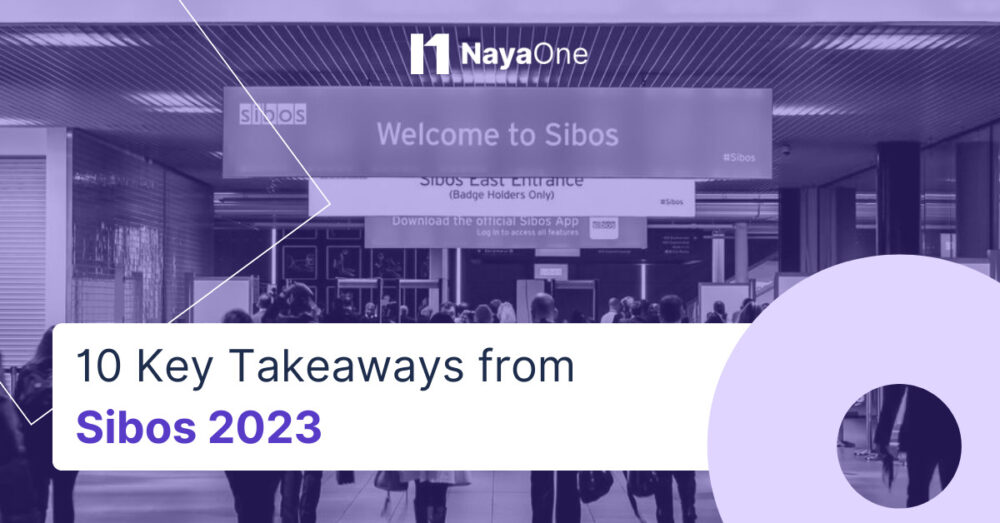
Kris Dickinson
Director, Financial Services
The Sibos 2023 Toronto conference, themed ‘Collaborative Finance in a Fragmented World,’ was a pivotal event in this year’s agenda. From September 18 to 21, 2023, an array of experts from the financial ecosystem gathered to explore the most pressing questions shaping the future of finance.
With over 250 sessions on topics ranging from cross-border payments to digital currencies, AI, sustainability, and more, the event provided a wealth of insights for financial organisations to utilise in their decision-making process. We’ve compiled the top 10 key takeaways from this event, providing valuable perspectives on how these insights are reshaping the financial sector.
Top 10 Key Insights from the Sibos 2023 Conference
1. AI Holds Immense Transformative Potential in the Financial Industry, Yet Needs to be Used with Responsibility
Discussions at Sibos 2023 focused on the responsible use of AI and emphasised the need for industry standards and governance that would ensure fairness, privacy, and security. AI holds the potential to revolutionise financial services. However, there is a consensus that the industry needs to develop standards and regulations with input from all market players.
Additionally, the event highlighted the importance of collaboration between banks and fintechs, particularly in implementing AI-powered solutions like anti-money laundering (AML) systems. Industry experts also explored the implications of generative AI. They acknowledged its transformative potential while highlighting the need for careful consideration and industry collaboration to effectively harness its benefits.
2. Collaboration Is the New Form of Competition
Collaboration has become a pivotal strategy in the financial industry. Leading banks such as Bank of America are actively partnering with fintech companies. This approach allows traditional banks to harness fintech innovation, particularly in areas like cloud technology and API development.
By leveraging fintech expertise, banks can:
- Transform their operations,
- Modernise their IT infrastructure,
- Offer seamless onboarding experiences,
- Enhance user interfaces, and
- Meet the evolving expectations of tech-savvy customers.
Furthermore, these partnerships bolster cybersecurity and compliance measures and ensure the highest levels of security and regulatory adherence. This collaborative approach empowers banks to remain agile, adapt to changing market dynamics, and expand their service offerings. As a result, they can deliver enhanced value to their customers in an increasingly interconnected financial landscape.
3. The Importance of Cross-Border Payments for the Masses Is on the Rise
Swift announced its partnership with UK-based fintech Wise during the Sibos 2023 conference. Both companies have teamed up to enhance cross-border payment options for financial institutions and their customers. As a result, international payments will become faster and more cost-effective for banks.
This partnership enables financial institutions to send Swift payment messages to the Wise Platform via the network’s Correspondent Services solution without needing extensive system changes. The Wise Platform will then leverage advanced Swift capabilities, including cloud technology and API connectivity, while adhering to Swift GPI standards for payment tracking.
The Sibos conference also discussed the evolution of low-value cross-border payments and the rise of alternative payment models in the industry. Cross-border payments are of paramount importance as they underpin global trade, investment, and economic stability as they can:
- Enable businesses to engage in international commerce,
- Facilitate capital flows and investments,
- Ensure timely remittances for families,
- Promote financial inclusion,
- Enhance economic stability by reducing financial friction, and
- Stimulate innovation and competition in the financial industry.
Overall, efficient and accessible cross-border payment systems are essential for fostering economic growth and connectivity across borders.
4. User Experience Is at the Forefront, Driven by AI-powered Self-service Onboarding
Financial institutions are recognising the importance of providing seamless, user-friendly interfaces that allow customers to effortlessly navigate complex financial processes. AI-driven self-service onboarding allows customers to access and utilise financial services quickly, eliminating the need for cumbersome paperwork or lengthy approval processes.
This not only enhances customer satisfaction but also fosters loyalty. Furthermore, the integration of AI technologies brings increased efficiency and speed to the industry. Customers can open accounts, apply for loans, or access various financial products in a matter of minutes, enhancing their overall experience and making financial institutions more competitive.
5. Trust Is the Cornerstone of Success in the Financial Sector
Customers and stakeholders alike rely on financial institutions to safeguard their assets and data while providing innovative and efficient services. Truist has pointed out the significance of striking a delicate balance between innovation and security through its dual-cloud strategy.
In an era where digital transformation and cutting-edge technologies are reshaping the financial landscape, maintaining the highest standards of security is non-negotiable. Public clouds offer scalability, agility, and cost-efficiency, enabling organisations to stay at the forefront of innovation and rapidly deploy new services to meet customer demands. However, it’s essential to recognise the sensitivity of financial data and the importance of robust security measures and employ tools and strategies to protect critical information and transactions.
6. APIs Are Driving Growth and Real-Time Connectivity
Financial institutions are increasingly recognising the pivotal role that APIs play in streamlining operations, facilitating quicker onboarding processes, and fostering real-time interactions both within and outside the organisation. With APIs, organisations can achieve:
- Streamlined operations: APIs allow seamless integration of disparate systems and applications. This streamlines internal processes, reducing manual interventions and enhancing operational efficiency.
- Quicker onboarding: Speed is of the essence in the financial sector, especially when it comes to onboarding new customers. APIs transform this process by automating various tasks, such as identity verification, credit checks, and account setup. This not only expedites the onboarding experience but also enhances customer satisfaction by providing a hassle-free and efficient journey.
- Real-time interactions: APIs empower financial institutions to offer real-time interactions to customers, such as checking account balances, making transactions, or receiving personalised financial insights. Moreover, APIs facilitate external connections with fintech partners and enable the seamless integration of third-party services into the banking ecosystem.
- Enhanced security: Security remains a paramount concern in the financial sector. Therefore, leading financial institutions prioritise robust API security measures to protect sensitive customer information and transactions. This includes authentication, encryption, and monitoring protocols to ensure data integrity and safeguard against cyber threats.
- Innovation and competitive advantage: Last but not least, APIs catalyse innovation, allowing financial institutions to swiftly adopt emerging technologies such as blockchain, artificial intelligence, and data analytics. These technologies enhance the quality of financial services, drive product innovation, and give banks a competitive edge in a dynamic market.
7. The Economy-as-a-Service (EaaS) Model is Reshaping Financial Services and Other Sectors
The Economy-as-a-Service (EaaS) model is transforming the financial services industry by offering goods and services on a subscription basis rather than traditional ownership. This approach is making financial services more modular, scalable, customisable, and integrated, aligning them with the evolving demands of modern economies.
EaaS is not only changing how businesses operate but also how people work and live, thus enabling greater flexibility and efficiency. The benefits of EaaS include:
- Enhanced operational efficiency,
- Improved customer experiences,
- Scalability,
- Fostering innovation,
- Market expansion, and
- Effective risk management.
The rise of mobile app-based banking has been a significant driver of EaaS in retail banking, as it has changed user interactions and distribution methods. EaaS is also gaining traction in capital markets and investment banking, which is allowing banks to focus on unique value propositions while outsourcing non-client-differentiating processes.
8. Real-time Treasury Management and Regulatory-compliant Data Handling Are Top Priorities
Real-time treasury management enables organisations to optimise liquidity, manage risk, and make swift financial decisions in response to market dynamics. This approach ensures efficient fund deployment and minimises financial risks.
Simultaneously, regulatory-compliant data handling is crucial to meet stringent data privacy, reporting, and security regulations in the financial sector. Robust data security measures, adherence to industry-specific standards, and accurate regulatory reporting help safeguard customer data, mitigate legal and reputational risks, and foster trust among customers and regulators. These combined efforts uphold data integrity and security and enable financial institutions to navigate a complex regulatory landscape and make informed real-time financial decisions.
9. Corporate Banking Is Shifting from Financial Services to Providing Valuable Data-driven Insights to Businesses
In addition to credit and guarantees, banks are now focusing on leveraging their vast data resources to help management teams make informed decisions. This is driven by its role as a strategic asset, powering decision-making processes and enhancing corporate performance.
Major financial institutions possess extensive data, which allows them to offer valuable insights as a service to their clients. This can improve business operations and benefit both companies and their customers. These insights range from macro-level market trends to granular, business-specific analytics, enabling businesses to respond swiftly to changing environments and optimise strategies.
The integration of data services into corporate banking is becoming a competitive differentiator. It’s expected to strengthen relationships between banks and businesses while providing more comprehensive and actionable information for all stakeholders.
10. The Maturing Open Banking Infrastructure Is Unlocking Opportunities for More Complex Use Cases
Open banking has reached a level of maturity where it is increasingly used for intricate financial operations, notably in payments. According to a survey by Omdia, 36% of payments issuers and acquirers see “new payment services” as a top opportunity resulting from open banking, with the EMEA region showing the most potential in open banking payments.
The European Commission’s publication of the third Payment Services Directive (PSD3) in June 2023 marks the beginning of the transition from open banking to open finance. PSD3 addresses crucial issues such as API quality and proposes a new financial data access (FIDA) framework to provide secure access to a wide range of financial data. It grants financial service providers the right to access various financial data on behalf of customers. This can enhance transparency and enable third parties to offer value-added services.
Globally, countries like the US and Australia are also adopting open banking regulations. This is expanding their potential for new use cases and empowering consumers and businesses to better access and manage their finances.
Conclusion
Sibos 2023 conference highlighted key insights that are reshaping the financial industry. It emphasised the responsible use of AI, the significance of collaboration in a rapidly evolving landscape, and the importance of efficient cross-border payments among other developments These insights reflect the dynamic nature of the financial industry and its commitment to adapt, innovate, and provide superior services to meet the evolving needs of customers and markets.
Has Sibos 2023 prompted you to expand your fintech partnerships? NayaOne can facilitate that for you. Our fintech marketplace gives you access to hundreds of different fintechs. We partner with your organisation to assess your needs and suggest, test, and deploy the most suitable fintechs for your needs while leveraging our Digital Sandbox to ensure seamless integration and the safety of your data.






